Men of Integrity: John Philip Sousa and Ray’s Daddy
Ray and I have had sweet memories of his daddy recently. Ray was able to reconnect a few days ago with John Vaughan, the minister who baptized Ray in 1971. Brother Vaughan and Ray’s daddy later became good friends. When Ray and Brother Vaughan spoke on the phone, he told Ray that he thinks of his dad often. With moist eyes, Ray told me that John said that Wesley Notgrass was “one of the finest men he has ever known.” I agree.
Ray’s dad was a big fan of marches composed by John Philip Sousa. When we decided to attend the Air Force Band concert recently, we both knew that his dad would have really enjoyed it. Ray said that we were going in honor of his dad. We love Sousa music, too, but, when the band played “Stars and Stripes Forever” at the concert, the thrill wasn’t only for ourselves.
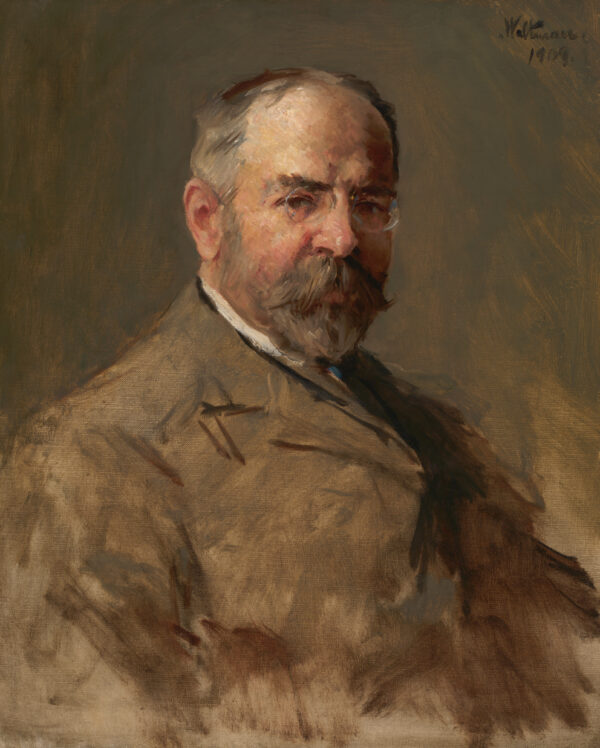
John Philip Sousa by Harry Franklin Waltman, 1909
Courtesy of the National Portrait Gallery, Smithsonian Institution;
gift of the Sousa Corporation; frame conserved with funds
from the Smithsonian Women’s Committee
I have enjoyed learning about the life of John Philip Sousa. He was born in 1854 in Washington, D. C., the son of immigrants. His parents were John Antonio and Maria Elisabeth Trinkaus Sousa. His father was born in Spain of Portuguese parents. His mother was born in Bavaria in Germany. John Philip grew up around the music of a military band. His father was a trombonist in the U. S. Marine Band.
When Sousa was around six years old, he began to study at a private music conservatory. He studied alto horn, baritone, cornet, flute, piano, trombone, violin, and voice. His father gave him additional instruction on the trombone. Even as a child, John Philip could play a musical score almost perfectly the first time he saw it. He also had perfect pitch. Being in Washington, D.C., during the Civil War was a strong influence. His parents took him to visit wounded soldiers. When he was 10 or 11, his father began taking him to Marine Band rehearsals, where the conductor allowed him to play the triangle, cymbals, or the alto horn.
When John Philip Sousa was 13 years old, he was tempted to run away with a circus band, but he decided not to go. His father enlisted him as an apprentice musician for the Marines. The younger Sousa continued to take music lessons. He studied musical composition, harmony, and violin. When Sousa was 18 years old, he published his first musical composition, “Moonlight on the Potomac Waltzes.”
The Marines discharged John Philip Sousa from his apprenticeship when he was 21. He began to give performances on the violin and later conducted orchestras for Broadway plays in New York City. There in 1879, he met and married Jane van Middlesworth Bellis.
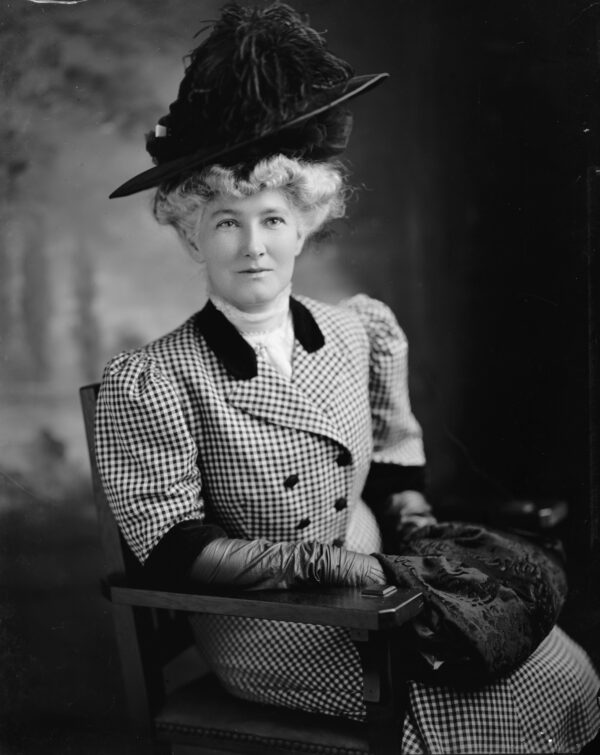
Jane van Middlesworth Bellis Sousa. Courtesy of the Library of Congress.
Sousa took his bride to Washington, D.C., in 1880. He soon became conductor of the U.S. Marine Band, also called The President’s Own. Sousa conducted the band during the presidencies of Hayes, Garfield, Arthur, Cleveland, and Harrison.
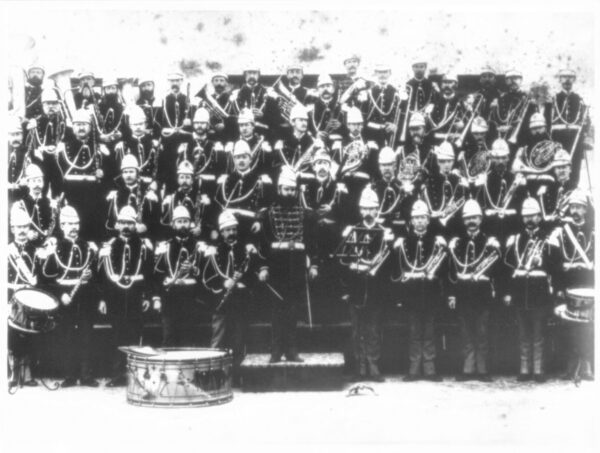
Conductor John Philip Sousa and the U.S. Marine Band
Courtesy of the Library of Congress.
In 1892 Sousa left the Marine Band and formed a new civilian band. Within months, his band earned respect as one of the finest bands in the world. Bands were popular entertainment during the late 1800s and early 1900s. Small American towns had their own bands. As a young man, Ray’s dad was a member of his hometown band. He played the glockenspiel.
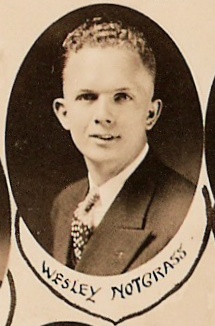
One of the instruments that the Marine Band used was a double B-flat bass tuba. Sousa thought the instrument was fine for parades but was too loud for concerts. He spoke with James Walsh Pepper, who manufactured instruments in Philadelphia. Sousa shared with Pepper his idea of making a bass instrument with a bell that could be pointed upward so that it would make a full warm tone over the band. Pepper made the instrument and called it the Sousaphone.
Sousa hired the highest quality musicians and soloists and paid them well. Through the years, some of the world’s most famous artists performed with him. Each year Sousa’s band toured America. He became the first American superstar. When his band came to a small town, the town declared it Sousa Day. Schools and businesses shut down. Audiences enjoyed watching Sousa conduct his band. His posture was straight and tall. He kept his feet firmly in one place, but his arms, wrists, hands, and head led with emotion. It was easy for the audience to see Sousa’s hands because he wore a new pair of white gloves at every concert.
When performing, Sousa made pleasing his audience his first priority. When attending a Sousa performance, audiences knew that they would hear every piece played to perfection. People the world over flocked to see Sousa and his band. Sousa took his band on a world tour in 1910 and 1911. Starting and ending in New York, they performed in Great Britain, the Canary Islands, South Africa, Australia, New Zealand, the Fiji Islands, the Hawaiian Islands, Canada, and the United States. In addition to the world tour, the band made four tours of Europe. Sousa believed that by entertaining his audiences, he could introduce them to good music. His band performed over 15,000 times between 1892 and 1931.
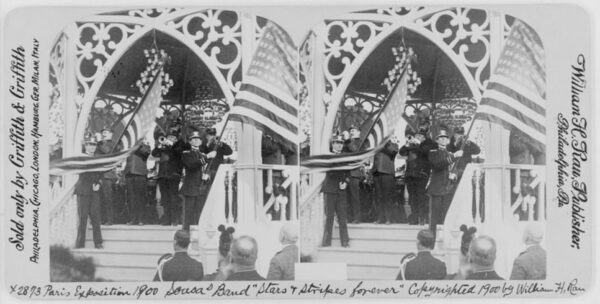
Sousa Band performs at the Paris Exposition, 1900,
Courtesy of the Library of Congress.
All his life Sousa continued to study the music of other composers. Sousa had an amazing memory. He composed songs in his head and wrote them down from memory. He often wrote in ink, making few changes or corrections. Sometimes he sent a musical piece to his publisher without ever having heard it played on the piano. Sousa gained a reputation as the March King. He believed that a march should “make goose pimples chase each other up and down your spine.” While serving as the conductor of the Marine Band, he had written “The Washington Post March,” which became the most popular song in America and in Europe. Sousa and his wife went on a European vacation in 1896. Sousa said that “Stars and Stripes Forever” played in his mind on the ship while they sailed home. He wrote it down on Christmas Day.
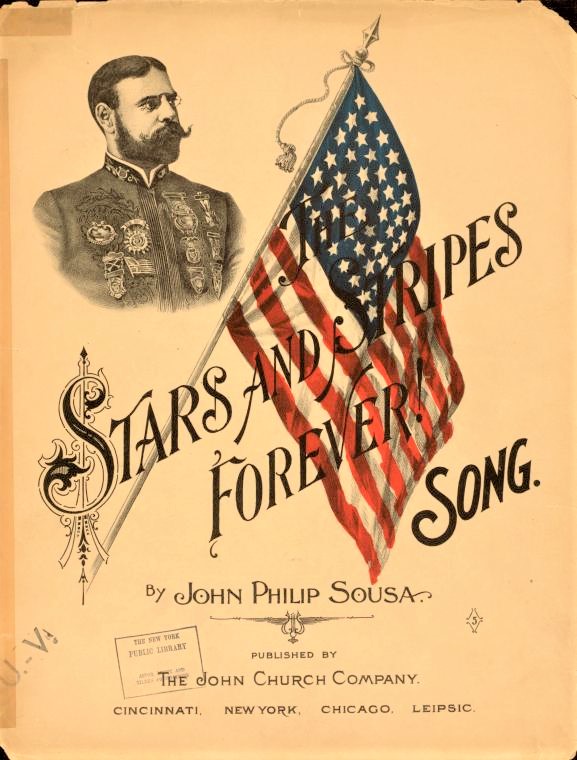
Courtesy of the New York Public Library.
From childhood John Philip Sousa was industrious and optimistic and had a wonderful disposition. People enjoyed being around him. He was a humble man who was tolerant of others. Sousa had extremely high personal morals. One of his managers said that Sousa gave the impression of trying to be the most honorable man who ever walked on the face of the earth.
Sousa generously contributed his time and energy to projects such as the National School Band Contests, the National Music Camp, and the American Bandmasters Association, of which he was honorary life president.
Sousa had deep respect for his mother, who encouraged him to follow her teachings. Keeping Sunday as a special day was very important to her. Sousa did not write songs on Sunday. He arranged several hymns and played them only during Sunday concerts. He wore a white uniform when performing on Sunday; on the other six days, he usually wore black.
Sousa enjoyed his time at home with his wife, Jane, their son, John Philip Sousa Jr., and their daughters, Jane and Helen. He was gifted at leading family conversations around the dinner table. His hobbies included horseback riding and other outdoor activities. Sousa was curious and eager to learn. His home had a large library. He wrote an autobiography, Marching Along, and three novels.
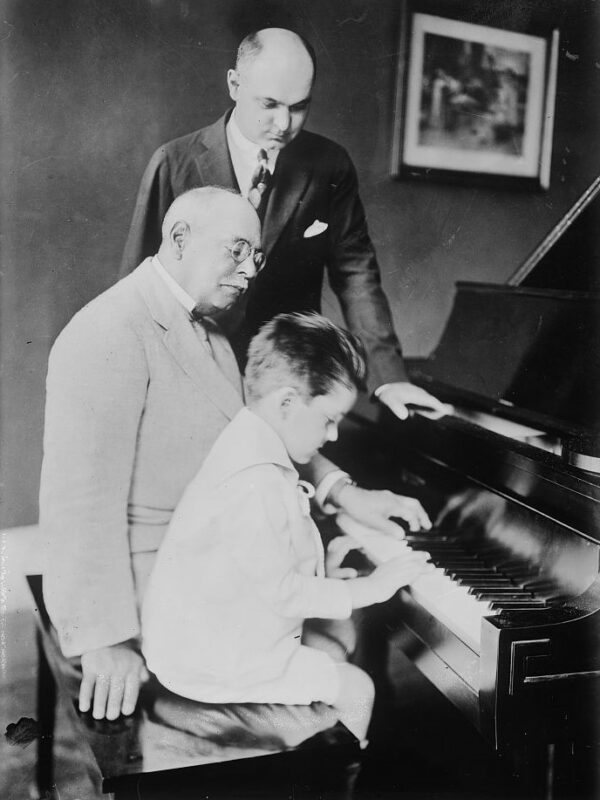
John Philip Sousa (seated) with his son and grandson.
Courtesy of the Library of Congress.
John Philip Sousa joined the U.S. Naval Reserve during World War I. He was 62 years old. He was given the rank of lieutenant and paid an honorary salary of $1 per month. He organized a band at the Great Lakes Naval Training Station.
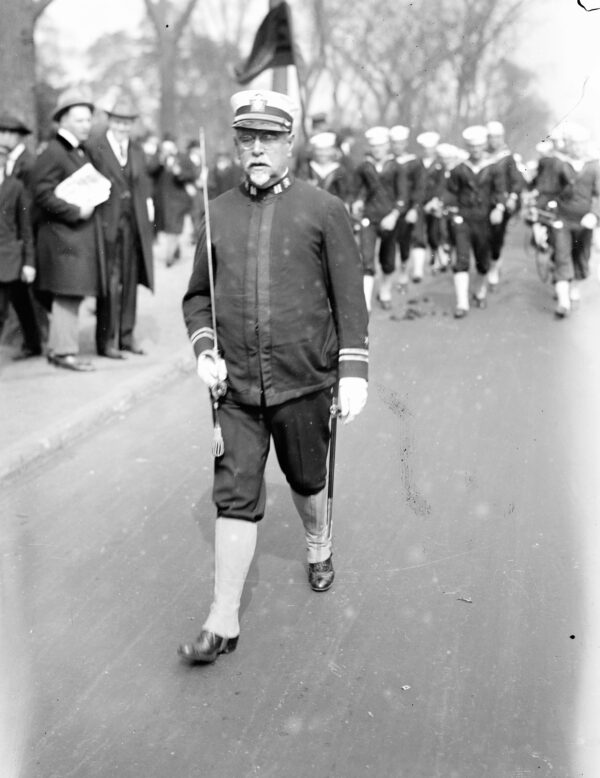
John Philip Sousa marches with the Great Lakes Naval Band, 1918.
Courtesy of the Library of Congress.
Sousa continued to work tirelessly. On March 6, 1932, John Philip Sousa conducted a rehearsal for a band in Reading, Pennsylvania. That night he attended a banquet in his honor. He died the following morning in his hotel. He was 77 years old.
Honor your father and your mother,
as the Lord your God has commanded you,
that your days may be prolonged
and that it may go well with you on the land
which the Lord your God gives you.
Deuteronomy 5:16

